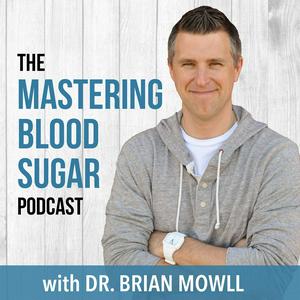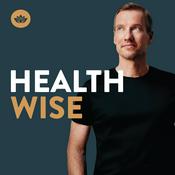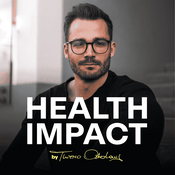57 Episoden
- 🎥 In this episode, Dr. Brian Mowll welcomes Holly Bertone, a former FBI counterintelligence analyst turned holistic health coach, to talk about breaking free from emotional eating and food cravings.
Holly shares her 40-year struggle with emotional eating, her rock-bottom moment, and how she transformed her FBI training into a practical three-step system to help women quiet food noise and build a healthier relationship with food.
From FBI to Food Freedom
Holly opens up about her journey—from high-achieving professional to cancer survivor, to health coach—while secretly battling shame, cravings, and late-night ice cream binges. Drawing on her background in pattern analysis, she explains how she discovered the “hidden codes” behind emotional eating and how reframing those patterns helped her and her clients regain control.
Why Willpower Doesn’t Work
Diets and “everything in moderation” often fail because cravings begin in the brain—before food even touches your lips. Holly breaks down the science of dopamine, the half-second decision window, and why emotional eating isn’t about discipline. Instead, it’s about seeing your triggers, stopping them in real time, and shifting your brain’s pathways.
The 3-Step FBI Method
Holly shares her signature framework—See It, Stop It, Shift It—to uncover triggers, interrupt cravings, and rewire your brain. Through this process, food stops being a source of comfort and simply becomes food. She explains how clients are able to “put the fork down” within 10 days, and why retraining the brain is more effective than chasing the latest diet.
The Bottom Line
Food cravings, stress eating, and guilt don’t have to control your life. By applying neuroscience and pattern recognition, Holly shows that emotional eating isn’t about willpower—it’s about building new, healthier pathways. With the right tools, food can finally take its place as nourishment, not a coping mechanism.
Key Takeaways
3:15 – Holly’s story: from FBI agent to health coach
6:40 – The cycle of cravings, shame, and food noise
10:25 – Why “moderation” and willpower don’t solve emotional eating
14:50 – Belly hunger vs. brain hunger explained
18:40 – How food soothes emotions like stress, boredom, and loneliness
25:10 – The limitations of intuitive eating when cravings run the show
31:00 – The 3-step process: See It, Stop It, Shift It
37:20 – Potty training your brain: retraining automatic responses
43:10 – Early wins: clients putting the fork down in 10 days
45:55 – Holly’s free gift: The Emotional Eating Tactical Blueprint
Resources
🎁 Get Holly’s free Emotional Eating Tactical Blueprint: DM “blueprint” to @holly.berton on Instagram
Follow Holly on Instagram: @holly.berton
Learn more about Dr. Brian Mowll: https://drmowll.com
Support the show
Support the show - 🎥 In this episode, Dr. Brian Mowll welcomes Dr. Kaity Castillo, a nurse practitioner and metabolic health coach, to discuss how she helps people reverse type 2 diabetes and regain control of their blood sugar through personalized nutrition and lifestyle interventions. Kaity shares how she went from conventional diabetes management to building a whole-food, patient-first approach—and how CGMs, strength training, and strategy make all the difference.
From Nurse Practitioner to Blood Sugar Coach
Kaity shares her journey through nursing school, becoming a family nurse practitioner, and ultimately earning her doctorate with a focus on improving blood glucose control. Realizing the limitations of traditional care, she began applying low-carb and whole-food approaches to help her patients reduce insulin resistance and medications—successfully.
What Actually Works for Blood Sugar Control
Dr. Kaity discusses why one-size-fits-all advice fails, and how she tailors programs using real-time CGM data, protein-first strategies, and simple behavior shifts. Whether it’s moving from oatmeal to eggs, or walking after meals, she outlines how small adjustments lead to big change.
Why Mindset Matters More Than Motivation
The clients who succeed the most aren’t perfect—they’re consistent. Kaity explains how preparation, expectations, and mindset shape long-term success. It’s not about staying on keto forever—it’s about learning which foods work for your body, then building a sustainable lifestyle around that.
The Bottom Line
Reversing insulin resistance doesn’t happen overnight, but it is possible. From patients in private practice to clients around the country, Dr. Kaity shares the strategies that work—and why the future of diabetes care lies in education, personalization, and empowering people to take control of their own health.
Key Takeaways
3:45 – What nurses are (and aren’t) taught about diabetes
6:12 – How Kaity builds custom plans for clients using CGMs
8:24 – Keto vs. clean keto vs. real food—what really matters
10:11 – Kaity’s personal story: helping her dad reverse prediabetes
12:50 – Why mindset and exit strategies are key to success
15:34 – Exercise, strength training, and walking after meals
18:30 – The prep problem: why people don’t follow through
21:30 – Lessons from Kaity's doctoral research
24:15 – Patient vs. coaching motivations: what drives success
26:40 – Medications: useful tool or long-term crutch?
29:55 – CGM insights: spikes, slopes, and blood sugar variability
34:50 – The truth about reversing diabetes: slow is fast
Resources
Website: www.nutritionmadesimpl.com
Dr. Kaity on Instagram: www.instagram.com/drkaitycastillo
YouTube: www.youtube.com/channel/UCosmc75v-B2Dk7GWyEyFFMw
Support the show Why You’re Gaining Fat on Keto: Craig Emmerich on Insulin Resistance, Fat Cells & Real Fixes
13.5.2025 | 53 Min.🎥 In this episode, Dr. Brian Mowll is joined by Craig Emmerich to unpack the real roots of insulin resistance, why simply eating low carb isn’t enough, and what most people get wrong about fat loss. Craig explains the “personal fat threshold” and how the size—and not just the number—of your fat cells may determine your metabolic health. They also dive into protein prioritization, satiety, and how simple shifts can dramatically improve insulin sensitivity.
Why You’re Storing Fat (Even on Keto)
Craig breaks down why excess fat storage is less about carbs and more about overwhelmed fat cells. It’s possible to become insulin resistant—even without eating sugar—if your fat cells are full and can’t accept more. This flips the script on the traditional carb-insulin model and explains why even lean people can develop type 2 diabetes.
How to Shrink Fat Cells and Build Metabolic Flexibility
Fat cells need to be “small and happy,” not stuffed. The key to reversing insulin resistance is improving your body’s storage capacity for energy—through fat loss and muscle gain. Craig shares how cutting dairy and nuts, using protein-sparing modified fasts, and strength training all help restore insulin sensitivity and balance hunger hormones like leptin.
Why Whole Foods and Protein Still Win
Despite debates in the low-carb space, Craig emphasizes that success comes from prioritizing protein, eating real food, and avoiding fat-carb combos—especially ultra-processed ones. He also discusses how creatine can improve not just muscle mass, but also sleep, mental health, and energy levels.
The Bottom Line
Fat loss and metabolic health aren’t just about carbs or calories—they’re about how your body processes energy. If your fat cells are full and your muscle mass is low, no diet will fix that. This episode gives you a science-based, practical roadmap to restore insulin sensitivity and reclaim your health.
Key Takeaways
5:24 – Why overfilled fat cells trigger insulin resistance
11:48 – Personal fat threshold: why even lean people get type 2 diabetes
17:32 – What the carb-insulin model gets wrong
22:55 – The dangers of ultra-processed fat-carb combos
30:44 – Why protein drives satiety and fat loss
35:20 – How overeating fat can backfire on low-carb diets
42:01 – The impact of cutting dairy and nuts
46:00 – The surprising mental health benefits of creatine
Resources:
📘 Website: www.ketomaria.com
📗 Craig & Maria’s books & coaching: www.keto-adapted.com
📕 Craig’s resource hub: www.ketomaria.com
Support the show
Support the show- 🎥 In this episode, Dr. Brian Mowll sits down with Dr. Robert Lufkin to explore the hard truths about modern medicine, the myths we’re still teaching in medical schools, and the powerful role of lifestyle in reversing chronic diseases. Drawing from his book Lies I Taught in Medical School, Dr. Lufkin challenges conventional thinking on diabetes, aging, and metabolic health—and shares the lifestyle interventions that actually work.
Why Most Chronic Diseases Are Lifestyle-Driven
Dr. Lufkin explains why diseases like type 2 diabetes, heart disease, and even Alzheimer’s are often preventable and reversible—not through pills, but through intentional lifestyle changes. He unpacks the science behind metabolic dysfunction and how our current healthcare system misses the root cause.
Rethinking Medical Education
Medical school trains doctors to manage disease, not reverse it. Dr. Lufkin shares how this training impacted his own health, what finally made him question the system, and why he believes the future of medicine lies in nutrition, movement, and personalized care—not prescriptions.
The Power of Prevention
From fasting and plant-forward eating to sleep, stress, and social connection, Dr. Lufkin outlines the six pillars of lifestyle medicine that form the foundation for lasting health. He explains how small, consistent changes can drastically reduce disease risk and even turn back the clock on aging.
The Bottom Line
Chronic disease isn’t inevitable—and it’s not your destiny. With the right tools, mindset, and support, it’s possible to take control of your health and rewrite your future. Dr. Lufkin’s message is clear: the cure isn’t coming in a pill. It’s already in your hands.
Key Takeaways
4:32 – Why the standard medical model is broken
9:45 – How Dr. Lufkin reversed his own prediabetes
15:20 – What medical students aren’t taught about nutrition
21:03 – The six lifestyle pillars for reversing chronic disease
28:18 – Fasting, aging, and cellular health
35:10 – Why personalized prevention is the future of healthcare
Resources:
Website: https://www.robertlufkinmd.com/
Book (Lies I Taught in Medical Schools): https://www.amazon.com/Lies-Taught-Medical-School-Conventional/dp/1637745834
Instagram: https://www.instagram.com/robertlufkinmd
YouTube: https://www.youtube.com/@RobertLufkinMD
Support the show - 🎥 In this episode, Dr. Brian Mowll welcomes registered dietitian Temple Stewart to discuss the power of low-carb nutrition for women’s health, insulin resistance, and metabolic healing. Temple shares her personal journey—from struggling with PCOS and weight gain to reversing her symptoms through a ketogenic approach. They break down why conventional diet advice often fails and how strategic dietary changes can help women take control of their blood sugar and hormones.
Why PCOS Is More Than Just a Hormonal Issue
Polycystic ovary syndrome (PCOS) is often treated with medication, but the real root cause for most women is insulin resistance. Temple explains how blood sugar dysfunction drives hormone imbalances—and why fixing insulin levels naturally can restore cycles, improve fertility, and reverse stubborn weight gain.
The Key to Sustainable Blood Sugar Control
Many women struggle with hunger, cravings, and low energy because they’re eating the wrong balance of macronutrients. Temple outlines how prioritizing protein, healthy fats, and non-starchy vegetables can stabilize blood sugar, support metabolic health, and make weight loss easier—without tracking calories or feeling deprived.
Why Muscle Matters for Women’s Health
Blood sugar control isn’t just about diet—muscle plays a crucial role in insulin sensitivity. Temple shares why women need to prioritize strength training, how even short workouts can make a big impact, and why building lean muscle is key to long-term health and disease prevention.
The Bottom Line
PCOS, insulin resistance, and metabolic dysfunction aren’t lifelong conditions. With the right approach to food, exercise, and supplementation, women can regain control of their health, improve hormone balance, and feel their best.
Key Takeaways
6:42 – Why PCOS is like “diabetes of the ovaries”
12:15 – The role of insulin in hormone imbalances
18:27 – How diet influences cravings and energy levels
24:49 – The best foods for satiety and metabolic health
32:10 – Why strength training is critical for women
38:21 – The supplements that can support blood sugar and hormone balance
Resources
Website: https://templestewartrd.com
Instagram: https://www.instagram.com/the.ketogenic.nutritionist
Facebook: facebook.com/templestewartrdn
Podcast: The Ketogenic Nutritionist with Temple Stewart, Registered Dietitian Temple Stewart, Registered Dietitian
-----------------------
Support the show
Support the show
Weitere Gesundheit und Fitness Podcasts
Trending Gesundheit und Fitness Podcasts
Über Mastering Blood Sugar
Learn how to use a real food diet, lifestyle modification, and functional medicine to master your blood sugar and reverse type 2 diabetes . Join diabetes expert Dr. Brian Mowll as he shares inspiring conversations with the world's leading health experts about how to transform metabolic health.
Podcast-WebsiteHöre Mastering Blood Sugar, Dr. Matthias Riedl - So geht gesunde Ernährung und viele andere Podcasts aus aller Welt mit der radio.at-App

Hol dir die kostenlose radio.at App
- Sender und Podcasts favorisieren
- Streamen via Wifi oder Bluetooth
- Unterstützt Carplay & Android Auto
- viele weitere App Funktionen
Hol dir die kostenlose radio.at App
- Sender und Podcasts favorisieren
- Streamen via Wifi oder Bluetooth
- Unterstützt Carplay & Android Auto
- viele weitere App Funktionen


Mastering Blood Sugar
Code scannen,
App laden,
loshören.
App laden,
loshören.






































